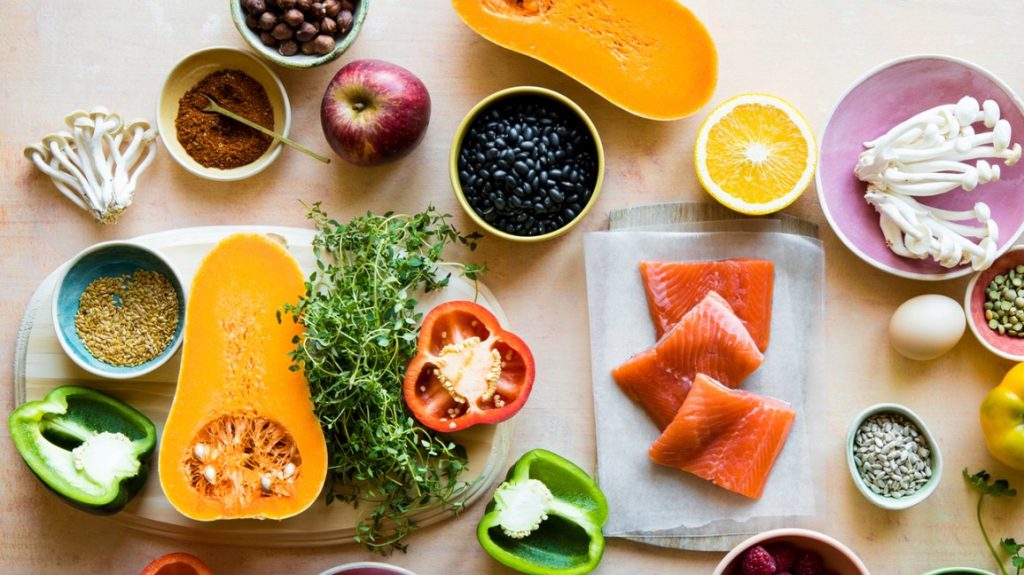Introduction
The benefits of a healthy diet cannot be over emphasized. This webinar will focus on the benefits of eating a variety of food and how to achieve dietary diversity with healthier options.
What is diet?
Diet is the combination of food that is eaten habitually. A healthy diet is one that helps maintain or improve health. However, nutrition describes the processes by which food is consumed and then absorbed and utilised as nutrients. Eating healthy involves choosing foods that are good for the body, prepared using healthy cooking methods like boiling, grilling, steaming and others, achieving energy balance and a healthy weight, eating a wide variety of food every day, limiting energy intake from total fats especially saturated fat, increasing consumption of fruits and vegetables, legumes, whole grains and nuts and limiting the intake of free sugars and salt.
Food Groups:
The food groups include water, fruits and vegetables, roots and tubers, grains, legumes, nuts, milk and dairy products, egg, fish, meat and meat products, fats and oil. It is important to eat from each of these food groups daily. However, meat that contains high amount of saturated fat should be limited. Sweeteners, condiments and beverages should be avoided.
Dietary Diversity:
This entails eating a variety of foods from all food groups but ensure you practice portion control as you do. Strive to eat from at least 4 food groups daily such that you would eat at least 20 biologically different foods in a week. Choose different types from each food group because no single food contains all the nutrients needed.
Fruits and vegetables are important for micronutrients. Meat group (chicken, fish, beans and peas) and whole grains are important for Vitamin B and other micronutrients. Yellow colored vegetables and palm oil are rich sources of Vitamin A. Let’s consider the different food groups.
Water :
Have at least 3 litres per day (I.e 6 sachets or 4 bottles). Drink before breakfast and also 15-30 minutes before meal. Benefits of drinking enough water daily: improves kidney functions, reduces risk of constipation, controls your weight. It helps avoid getting tired easily and having extra meals. It also gives a pale color to urine when water has been taken sufficiently.
Fruits and Vegetables:
These contain vitamins, minerals and roughage. They are also rich sources of antioxidants & phyto-chemicals. Have at least five servings of fruits and vegetables daily. Ensure it is part of a meal and not a side dish. Save cost by eating fruits & vegetable which are in season. See to eat fruits before a major meal daily. They can also be reconstituted into smoothies and juice. Remember to include diverse colors of fruits and vegetables especially dark green leafy and yellow fruits and vegetables. Low consumption of this group often leads to developing chronic diseases. Hence, they should be part of your diet.
Roots and Tubers:
They are a healthy group of specialized vegetables and they supply carbohydrates and other nutrients . An example is Potatoes which contain a lot of proteins.
Grains, Legumes & Nuts:
These contain significant sources of protein, fiber and energy. They aid proper bowel function and in the case of nuts, contain significant calories, fats and proteins. It is advised that fifty percent should be whole grains as regular use of highly processed grains is not healthful. You should eat some beans or peas daily but take caution in case of digestive disorders. Note that beans can be enjoyed without flatulence, the method of preparation would have to be considered.
Milk & Egg:
Milk is a complete single food. Although whole milk should be limited because of fat. You can drink low fat milk daily and eat 2 to 3 eggs per week. Frequent consumption of eggs may lead to increase in cholesterol which is not healthy.
Meat Group:
This group provides protein, fat and vitamins. However, you should limit meat intake and choose low fat meat like chicken without the skin and fish which is healthier than meat. To prepare, it is better to boil and grill than to fry.
A meat source like shellfish has abundant cholesterol, intake should be limited. Diseases that can be associated with excess intake include heart disease, intestinal disorders, osteoporosis, rheumatic disease, gout, diabetes and cancer.
Fats and Oil:
They provide a lot of calories. Most healthy fats are plant based except fish oil and bad fats are often animal based except palm oil and coconut oil. The healthiest dietary fat is plant based oil. Examples include cold-pressed olive oil, avocado oil , seed oils, soya oil.
Sweeteners, condiments & beverages:
Not more than 50 g of sugar/honey should be consumed per day. Salt should also not be added to cooked food on the table.
Chemical sweeteners are not healthful and excess sucrose leads to chronic diseases like obesity, hypertension and diabetes. Carbonated soft drinks contain Phosphoric acid and alcoholic beverages increase the risk of hypertension, oesophageal reflux, gastritis, liver disease, various types of cancer. Hence, their consumption should be limited.
Other things to note:
Eat more raw foods. Have a light breakfast. Eat slowly and avoid overeating. Eat fruits and vegetables in between meals. Avoid eating late (preferably less than 2 hours before bedtime).
Weight Control:
To achieve this, consume less than you expend; avoid being full. Avoid frequent consumption of unhealthful drinks, packaged foods, pastries & fried foods. Don’t skip meals, get enough rest/sleep. Move around and engage in planned exercise. Manage stress very well.
Conclusion
Drink at least 3 litres and stay well hydrated. Eat a wide variety of foods everyday. Give preference to whole grains, legumes and nuts. Eat at least 5 servings of fruits and vegetables and less intake of animal foods, pastries and unhealthy drinks. Balance intake with expenditure of energy and reduce risk of many ailments and chronic diseases.

